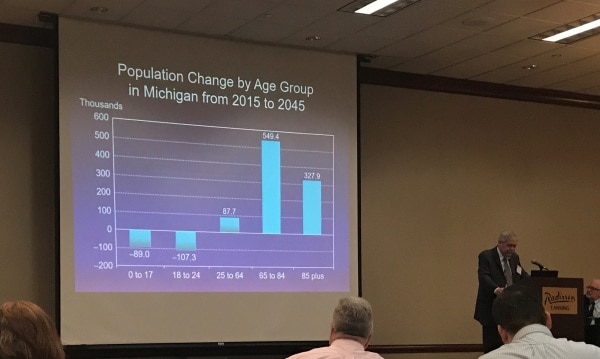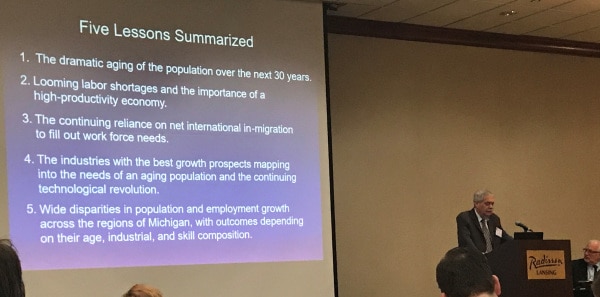Posted by – Steve Cohen, Director of Community Development
Yesterday, I had the opportunity to attend professional certification training in Lansing organized by the Michigan Association of Planning. The primary focus of the seminar, led by economists Dr. George Fulton, Lou Glazer, and Dr. Charles Ballard, was to educate city planners on the population, education, and economic trends that will impact local communities in the years ahead.
To summarize, the economists explained that Michigan is now considered a “Low Prosperity State,” in terms of household income, despite having a growing automotive sector. Startlingly, despite our strong economy, they reported that 40% of Michigan households can’t afford basic necessities due to low wages. The experts told us that 25% of households are experiencing increasing incomes, while 75% remain stagnant. This shift is creating a new class divide in Michigan and America that is primarily defined by college education attainment.

Auburn Hills has been preparing for the aging population. This slide shows a demographic shift is coming.
Planners learned that the dramatic aging of the population will create a labor shortage down the road due to a lack of younger workers replacing those who retire. Thus, people will need to develop skills that will mesh with the evolving knowledge and information based economy for the State to prosper economically. If Michigan does not produce or attract skilled workers, then companies will decide to locate in other States that can attract such a workforce. Occupations that will become increasing vulnerable will be those with routine tasks that can be automated such as retail and assembly/manufacturing.

21st Century job growth will occur in the medical and college educated professional fields
All three economists repeatedly told the audience that “you can’t turn the clock back and bring back low skill manufacturing jobs.” Most of those jobs have been replaced by automation and other industrial efficiencies. If Michigan does not proactively adapt to the new economy, municipalities – and ultimately their residents – will continue to struggle due to structural revenue declines and economic disparity. This is the New Normal.

Five lessons from Dr. George Fulton, Professor of Economics, University of Michigan
The training was excellent in that it raised awareness of the role of city planners in preparing for the aging population, fostering an environment for high-skill job growth, and creating places where people of all ages will want to live and work.
The City of Auburn Hills recognizes these trends and will continue to proactively work to be ready for the New Normal, so that we can play a role in helping Michigan “win” in the 21st century economy.
